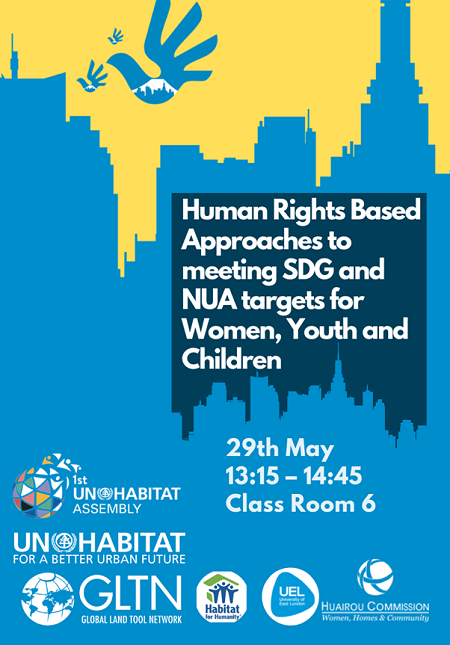“Human Rights-based Approaches to Meeting Sustainable Development
Goals and New Urban Agenda Targets for Women, Youth and Children”
UN Habitat Assembly, 29 May 2019, 13:15–14:45, United Nations at Nairobi, Classroom 6
Featuring presentations by panelists from University of East London, UN Habitat, Habitat International Coalition’s Housing and Land Rights Network, Huairou Commission, the Advisory Group on Gender Issues and Habitat for Humanity, the side event on “Human Rights-based Approaches to Meeting Sustainable Development Goals and New Urban Agenda Targets for Women, Youth and Children” addressed UN Habitat’s mandate within the framework of human rights as the international norms arising from centuries of struggle, learning and codification in law, that guide good practice of States. The Human Rights Treaties confer legal obligations on all organs of the State to affirm human dignity and pursue social justice. These common-but-differentiated obligations apply, therefore, to all central, regional and local governments and authorities.
The longer-term positioning of the UN Development System also calls for “reconciling humanitarian assistance with longer-term development objectives, within the framework of human rights” with their preventive and remedial applications. “Violations of human rights are often our best early warning signs of trouble.” Accordingly, “prevention…needs to be an integral part of the activities of the United Nations development system,” resolving “root causes,” especially in cases of conflict.
The Habitat Agenda has called for cross-sectoral human settlements planning, implementation and governance approach that emphasizes rural/urban linkages and considers villages and cities as points on a human settlements continuum in a common ecosystem (H2, para. 104). Within this principled Habitat Agenda context, States repeatedly have reaffirmed their standing commitments to operationalize their prior obligation toward the “full and progressive realization of the human right to adequate housing” (cited 61 times in H2).
While that norm is comprehensively defined in law [AR], the human right to adequate housing can be realized only through States’ and their successive governments’ respect, protection and fulfillment of all human rights interdependently and indivisibly. The panel presentations indicated how, in practice, these norms and corresponding obligations contain the legal basis that informs relevant policies, programs and projects, even for charity and welfare approaches.
To ensure successful statecraft, governments of States are bound under the Human Rights Covenants to perform the state’s duties by applying seven over-riding implementation principles, ensuring: self-determination of peoples, non-discrimination, gender equality, rule of law, progressive realization and continuous improvement of living conditions, the maximum of available resources, and international cooperation and assistance.
Thus, States are variously committed and obliged to implement these norms. The legal obligations are binding, permanent and subject to the periodic review of Treaty Bodies. Meanwhile the complementary political commitments, including the 2030 Agenda and New Urban Agenda, are voluntary, time bound and subject to cyclical renewal in political forums.
Humanity’s advancing urbanization of cities and human settlements, as well as the transformation of rural areas, provide the context to operationalize these obligations in line with the complementary achievement of the SDGs and other globally approved policy frameworks. The panel noted several examples of cities and local authorities operationalizing human rights locally under the various local-governance concepts developed over time, including: Human Rights City, Human Rights Habitat, Human Rights in the City, Rights of the City, Right to the City, Sanctuary City and Urban Rights.
The panel also emphasized women’s human rights and the role of women in human settlements planning, implementation and governance. These and related operational principles are reflected Global Platform on the Right to the City, “Women’s Right to the City Manifesto,” which addresses the roles of both women and men.
The common-but-differentiated challenge of UN Habitat, the UN Habitat Assembly, its related bodies, governments and other stakeholders lies in harmonizing these obligations and commitments aligned with the three pillars of the UN Charter. That conscious duty should ensure that human rights obligations remain paramount and lead the innovation for better lives called for in this first UN Habitat Assembly and beyond.
The side event was jointly organized by University of East London and UN Habitat. The panelists were:
M. Siraj Sait, Professor of Law and Development, University of East London;
David Thomas, Human Rights Expert, UN Habitat
Joseph Schechla, Coordinator, Habitat International Coalition’s Housing and Land Rights Network;
Mino Ramaroson, Regional Coordinator – Africa, Huairou Commission;
Stephen Seidel, Senior Director, Global Program Design and Implementation, Habitat for Humanity; and
Ana Falú, Chair, Advisory Group on Gender Issues.














